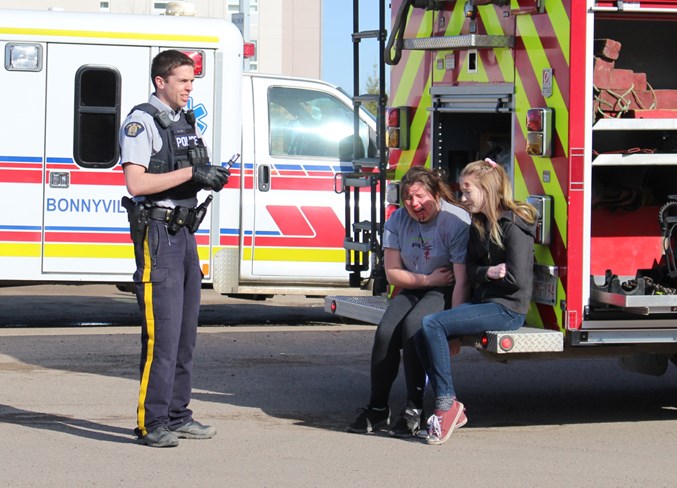One bad decision can change a life forever.
Grade 10 students gathered at the Bonnyville and District Centennial Centre on April 23 to watch the mock collision unfold.
The event is held every year as a way of reminding young drivers of the impact their choices can have on their family and the community.
"There's a lot of different distracted driving issues," noted Debbie Winstone, program manager for the Bonnyville Victim Services Unit (VSU). "We have impaired, drug-impaired... we have cellphones, that's a big thing, and sometimes I think kids just need to have a reality check because we all say 'that will never happen to us.'"
The local VSU partners with emergency responders to show the devastating results driving impaired can have.
Bonnyville Regional Fire Authority (BRFA) fire chief Jay Melvin said it's important to show just how far-reaching a car crash can be.
"It's not just only the family; it's our firefighters, paramedics, RCMP, victims services, and 911 (dispatchers). Everyone that would have touched that scene, whether through a phone call, physically on scene, or even family members of the responders, (they're) all affected by somebody's bad decision," he expressed.
This year's program focused on driving under the influence of marjuana. The scene that played out showed an impaired driver who ran a stop sign and drove into another vehicle carrying four students leaving a party. There were a number of people critically injured; one student was pronounced dead at the scene, while another succumbed to their injuries at the hospital.
"We (wanted) to give a demonstration to students on why we make good choices when we're driving," detailed Alicia Krawchuk, division chief for EMS. "Driving is a privilege, and if you abuse that privilege, bad things can happen. We're here to demonstrate to them first-hand this is what happens. This is very similar to what we see in the real world on the highways when bad accidents happen due to bad decisions being made."
Bonnyville Centralized High School (BCHS) Grade 11 student Kevin Zazula played the role of the impaired driver in the scenario. He stressed the importance for attendees to take the severity of the situation to heart.
"Last year, I had all of my friends and we were kind of joking around, like 'yeah, it wouldn't happen to me.' But, just because you don't think it would happen to you doesn't mean it won't. We have to take what we learn from people's experiences and apply it to our own lives," explained Zazula. "Last year, I didn't, so this is kind of like a good experience to learn from. Actually being in the mock collision can help you learn what to do and how to not get into that accident. Think before you drive."
Those hosting the event hoped that by showing a collision from start to finish, students were given some perspective in terms of what happens after you call 911.
"I hope that they get an understanding of what emergency responders do, how many people come to help out when somebody does phone 911, and get a real understanding of how one bad choice can affect a lot of people in this community," Melvin stated.
An emergency room scene took the scenario beyond the immediate response and offered a glimpse into how hard doctors and nurses work to save the lives of the victims of a crash.
According to Winstone, the mock collision was started in 2015 after "one of the RCMP members that came from Sylvan Lake had suggested it."
She added, "They do it down there, so we thought we'd give it a try... It's been really good, and the schools are really buying into it so that's good."
To drive the message home, guest speaker Kevin Brooks opened up about how a bad decision he made over a decade ago resulted in him becoming paralyzed.
After getting behind the wheel impaired and going too fast, Brooks' friend passed away as a result of the crash.
Brooks emphasized how his decision didn't just impact his own life, but many others.
Grade 11 BCHS student Michela Tharle believes the event teaches them the importance of planning ahead.
"Not many people truly think about what takes part in a car accident. They're like, 'one person in one car, one person in the other, and they crash because of drugs or alcohol,' but, it's a lot more than that. It could be one person just under the influence and everybody gets affected by it."



